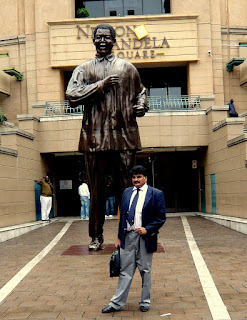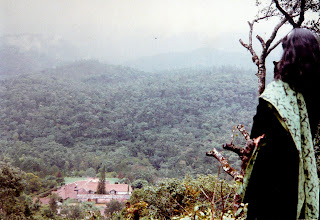Johannesburg in Summer

Johannesburg in January is like Kerala during the monsoons. It rains all over and the visibility is poor. Mists are rising and you will feel gloomy wanting to sit indoors.
There are occasional power cuts and the traffic lights are also not spared. Despite mismanagements in many areas of administration, the city is still beautiful and there is pomposity all around.
I stay in the Intercontinental hotel near the famous Wanderers club, in Sandton. All these areas are more like up market residential colonies. These are indeed the legacies of the past.
Just opposite to the Hotel is a famous big mall named after Nelson Mandela. There is a big bronze statue of the great man in this area.
While driving down to the Crown mines area, the navigator, Riaz showed us the area where Mandela now lives. Though ailing, he is still active for the benevolent and the charitable causes. Riaz says that the days spent in a jail make a man live longer because such days are rather free of worries and tensions. He seems to have a point. In India the Sanyasins (Sage) live longer than the Grihasthas (Sanskrit for householder) because of the same reason. A Grihastha’s life is never easy, I can vouch for that. After all, the food eaten by a Sanyasin also is donated by a hardworking Grihastha.
There are occasional power cuts and the traffic lights are also not spared. Despite mismanagements in many areas of administration, the city is still beautiful and there is pomposity all around.
I stay in the Intercontinental hotel near the famous Wanderers club, in Sandton. All these areas are more like up market residential colonies. These are indeed the legacies of the past.
Just opposite to the Hotel is a famous big mall named after Nelson Mandela. There is a big bronze statue of the great man in this area.
While driving down to the Crown mines area, the navigator, Riaz showed us the area where Mandela now lives. Though ailing, he is still active for the benevolent and the charitable causes. Riaz says that the days spent in a jail make a man live longer because such days are rather free of worries and tensions. He seems to have a point. In India the Sanyasins (Sage) live longer than the Grihasthas (Sanskrit for householder) because of the same reason. A Grihastha’s life is never easy, I can vouch for that. After all, the food eaten by a Sanyasin also is donated by a hardworking Grihastha.
There is no time for any sightseeing as the official meetings keep me tight. On Sunday, I go to Durban.
Johannesburg, 11th January 2008.
Johannesburg, 11th January 2008.



Comments
Indeed a very impressive article. There are much more to be seen and understood in Johanessburg.
Very rarely does one realise that Mohandas Karamchand Gandhi was the very first attorney of 'color' in South Africa, and that his office was set up in Johanessburg.
The guided underground mine tour at 'Gold Reef City', visting Soweto, Apartheid museum etc would give you an much more better picture about the history, and the rise of Johanessburg as the 'Gold Capital' of the world.
Through the writings of Wilbur Smith, one gets a wonderful idea of Africa, the gold rush and its enthralling past.
By the way, are you stationed in Joburg? I shall try to look up during my next trip.
Very much I am in Joburg, It would be my pleasure to be of any assistance, next time when you are in Joburg. I shall mail you my contact details.
I have a comment on the following point you made in your blog: "In India the Sanyasins (Sage) live longer than the Grihasthas (Sanskrit for householder) because of the same reason. A Grihastha’s life is never easy, I can vouch for that. After all, the food eaten by a Sanyasin also is donated by a hardworking Grihastha."
I have only been a Gr^hasttha, and so I am not qualified to comment on the status of a sannyAsi. But using my imagination I could say this much. A sannAsi also might have stresses and strains although they might not be in the realm of, say, making a living, relating to one's wife, or keeping one's job, etc. He (or she if it is a sannyAsini) might have inner struggles of an emotional nature such as dealing with the inward enemies such as the Kaama-kRodha-lObha-mOha-mada-mAtsarya sextet. Or he or she might have problems such as loss of EkAgrata when the mind slips into the kshipta or visshipta state as they are all all too human. Or even deep questions of a spiritual nature. Why is there so much suffering if God is full of compassion?
I have stayed at a monastery as a guest twice, and saw first hand that the monks as well as the acolytes had challenges of their own.
In the MahAbhArata there is a verse that says: Even a recluse who lives in the deep forest has friends, neutrals, and enemies.
I am not trying to contradict you here. I am just trying to empathize with -- get into the shoes of -- a monastic person and see his or her struggle. My wife's best friend has a brother who has been a monk for a long time, and now is having second thoughts about all sorts of things! May God guide him!
DKM Kartha (Mohanachandran)